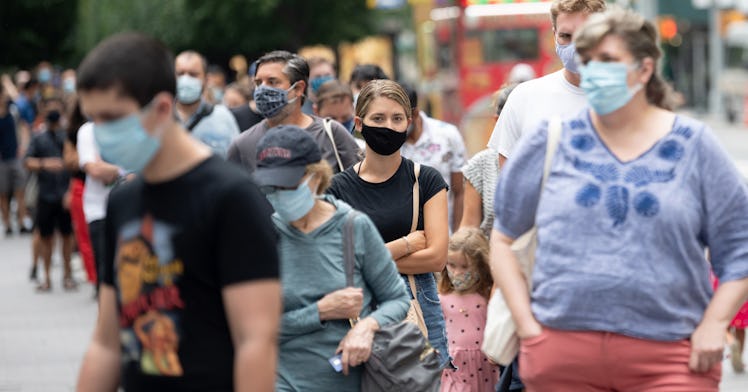Cloth Masks Protect Wearers from the Worst Effects of COVID-19
It’s not all about being a good neighbor. Masks also protect the wearer from the coronavirus.

Since the CDC began recommending it, wearing a mask has been a badge of selflessness. It may not be the most comfortable and it may not offer you much protection, but wearing a mask protects your community from you if you’re contagious with COVID-19. Some experts have been saying for weeks that cloth masks actually protect the wearer. On Tuesday, the CDC finally confirmed that wearing a mask offers “personal protection.” The reason? Cloth masks stop some coronavirus particles from reaching your face. If you get infected, it will be with a smaller dose, and you’ll be less likely to get sick.
Though wearing a mask might not prevent you from getting COVID-19, it can make you less likely to develop severe symptoms, Monica Gandhi, an infectious disease specialist at the University of California, San Francisco, writes in The Conversation. “[I]t might be the difference between a case of COVID-19 that sends you to the hospital and a case so mild you don’t even realize you’re infected,” she writes. The logic goes like this:
If you wear a cloth mask, you’re exposed to less virus. Though no mask is perfect, surgical masks and good cloth masks can block more than 80 percent of coronavirus particles from getting into your mouth and nose. (Blocked particles get caught up in the mask itself, which is why you should wash your mask frequently.)
If you’re exposed to less virus, you’ll probably get less sick, Gandhi writes. About a century of research shows this is true for many viruses. As soon as a virus gets into your body, it co-opts nearby cells to multiply. If you get a large initial dose of virus, the virus damages more cells and the immune system goes to extremes to stop it, which causes symptoms. But if only a little virus gets into the body, the immune system gets the infection under control quickly, before it resorts to drastic measures and before the virus can hurt many cells. This results in less symptoms.
“Studies demonstrate that cloth mask materials can also reduce wearers’ exposure to infectious droplets through filtration, including filtration of fine droplets and particles less than 10 microns,” according to a scientific brief from the CDC.
Animal models, particularly hamsters, support this theory. In one experiment, hamsters that were exposed to less virus had milder disease than those exposed to a higher dose. In another experiment, scientists pumped air from an infected hamster’s cage into a COVID-free hamster’s cage and covered some of the air pipes with surgical mask material. The “masked” hamsters were less likely to get COVID-19. Those that did get infected had less severe illness.
“It’s been a real deficiency in the messaging about masking to say that it only protects the other,” Charles Haas, an environmental engineer and risk assessment expert at Drexel University, told the New York Times. “From the get-go, that never made sense scientifically.” The idea that cloth masks protect the wearer “makes complete sense,” Linsey Marr, an expert in virus transmission at Virginia Tech, told the Times. “It’s another good argument for wearing masks.”
About 40 percent of people with COVID-19 are asymptomatic. But the percentage of infected people who don’t develop symptoms is higher where people regularly wear masks, such as at a seafood plant in Oregon that counted about 90 percent of their cases as asymptomatic. Cruise ships also drive the point home. Aboard Japan’s Diamond Princess cruise ship from February, before masks were commonplace, less than 20 percent of people who got infected were symptom-free. On a cruise ship that sailed from Argentina in March, the crew gave all passengers surgical masks after someone came down with a fever. More than 80 percent of those who got COVID-19 were asymptomatic.
Wearing a mask might not prevent you from getting COVID-19. But it could keep you from ending up on a ventilator if you do get infected. So wear a mask, not just to protect your neighbors, but to protect yourself too.
This article was originally published on